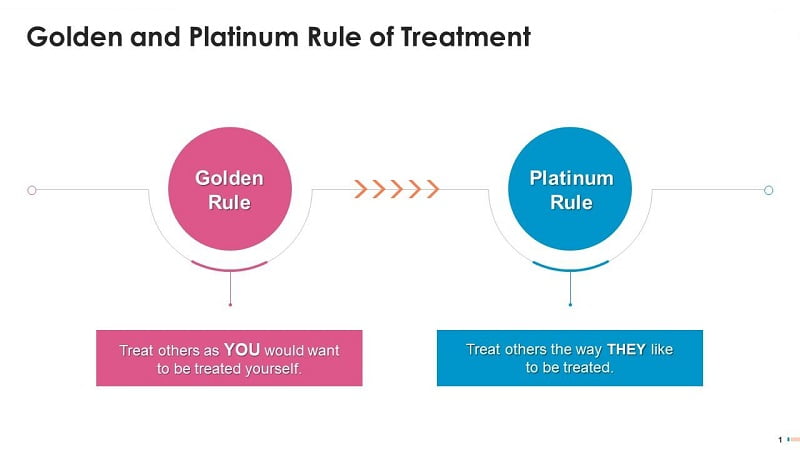Some call it karma; others call it destiny. Even most religions recognize it as a fundamental rule of human nature. It’s the golden rule, which says – Do unto others as you would have them do to you.
I know you must have probably heard it before or come across it somewhere. The golden rule is a moral principle hinged on empathy. It’s a think-first, act-second approach that nudges people into treating others with kindness and respect.
The golden rule is great for effective living and moral behaviour, but the platinum rule is supreme when it comes to business and customer service. We’ll find out why shortly.
What is the Platinum Rule?
The platinum rules state that we should “Do unto others as they’d like done unto them”. In other words, it means we should learn to understand people and handle them in a way that’s best for them, not just for us.
Frequently, we assume that what’s best for us is best for others without considering the views and preferences of the other party. In business, this assumption could be expensive and lead to a terrific end, because customers needs vary.
In his book, The Platinum Rule, Dr Tony Alessandra said, and I quote.
The Golden Rule can backfire and cause personality conflicts. Why? Because following The Golden Rule—treating people the way you’d like to be treated—means dealing with others from your perspective. It implies that we’re all alike, that what I want and need is what you want and need. But of course, we’re not all alike. And treating others that way can mean turning off those who have different needs, desires, and hopes.
Knowing how people want to be treated and treating them as such will not only make you likable. It will help you serve your customers better.

Five Steps To Sales Success Using The Platinum Rule
In their book Collaborative Selling, Alessandra and Barrera identified five steps to any successful selling process. They are as follows:
1. Contact
Every sales process starts by making contact with the prospect. Your first impression will determine if you’ll either make or break the sale. And that’s exactly where the platinum rule comes into play.
With knowledge of the platinum rule, you’ll be able to prioritize your prospect’s needs above your desire to close the sale. The key here is to listen to your client and adapt in a way that builds trust and credibility.
Here’s the thing: most people are afraid of salespeople because they don’t want to get sold or ripped off their hard-earned money. Superior product knowledge and high sensitivity to the client’s needs are essential for winning the sale at this stage.
2. Explore
Each prospect has a unique situation that the salesperson must explore before discussing a solution. As a student of the platinum rule, you aim to look out for your prospect’s problems and deepest fear. You can do this through research and repeated visits.
This stage aims to get information from the prospect by listening and asking the right questions. It would help if you were also sensitive to understand when the prospect is getting uncomfortable with your questions to stop or postpone the conversation.
When asking questions, refrain from asking questions that you can easily research. It might instigate doubt about your credibility and competence. Instead, surprise your prospects by preempting and answering questions on their minds and about their business. That’s how you win.
3. Collaborate
The goal of the Collaborate stage is for you and your prospect to find a solution that meets the prospect’s need. People tend to be more committed to a thing when they feel part of the solution.
In your quest to be perceived as an authority, you must ensure that your prospect agrees to the solution. Rather than using a monologue, the best salespeople engage in a dialogue to keep the client involved in a give-and-take.
In addition, as you discuss the solution, ensure that you relate it to your client’s business environment. A way of achieving this is by examining the benefits of your product to the prospect’s business.
4. Commit
The goal of the Commit stage is to gain a truly committed customer. If a salesperson has succeeded in impressing the prospect in the first three stages – Contact, Explore and Collaborate – then the sale should close itself in the Commit stage.
The prospect should be willing to give you their money at this stage. Else you should revisit the other three steps. Here, they should be asking “when” not “if”. Because the client now sees you as having their intentions at heart.
Salespeople have been taught to treat objections as a contest to the sales process, but students of the platinum rule see objections differently. They see it as an error on their part, not being diligent on the information-gathering stage. The key here is to ensure the prospect is willing to establish a long-term business relationship with you.
5. Assure
This is where most salespeople get it wrong. They stop communicating after the customer has committed or engaged in their services. While in reality, here’s where the real work to developing a long-term relationship with the client starts.
This stage aims to keep assuring the client that the service is going on smoothly and seek feedback from them after delivery. Always maintain communication with your clients, and seek their opinion where you need clarifications. Give a call to ensure their using the service.
These little acts show that you care about meeting their needs as much as you care about their money.
Conclusion: Golden Rule Vs Platinum Rule
Both rules are fantastic and have different applications. When it comes to business and commerce, the platinum rule has it. But, when it comes to social life and relationships, the golden rule has it. However, if you can master the two rules, you’ll be unstoppable. They are both good weapons of persuasion, influence and leadership.
Frequently Asked Questions
Dr. Tony Alessandra coined the platinum rule in his book – The Platinum Rule.
It is better because it prioritizes the interests of others, and give room for compassion, empathy, and mutual interests.





























